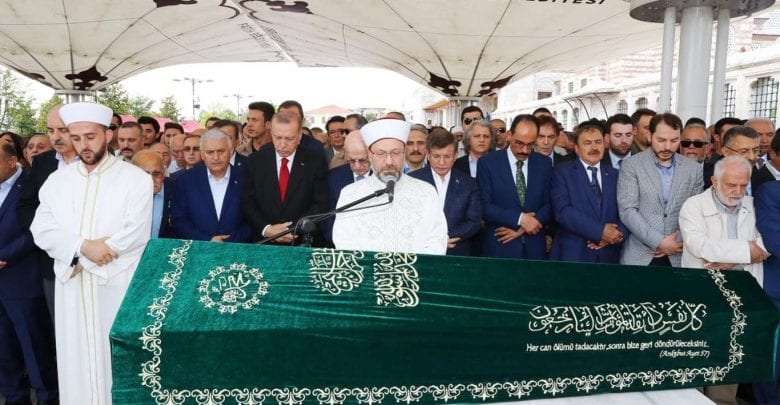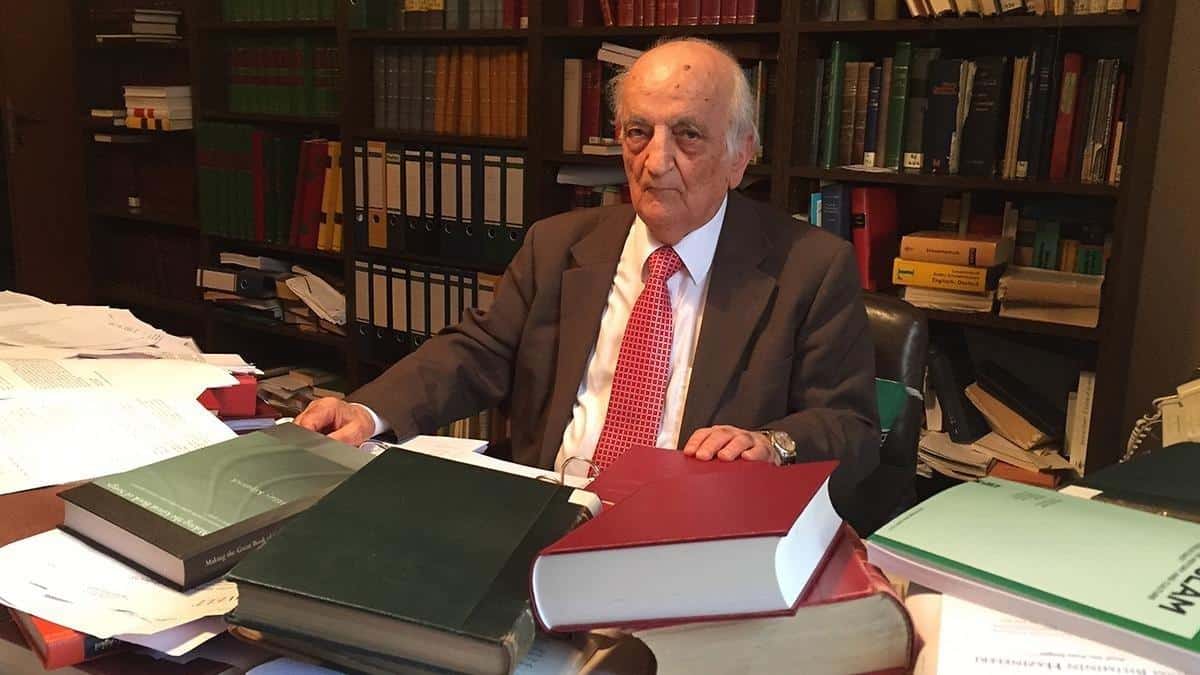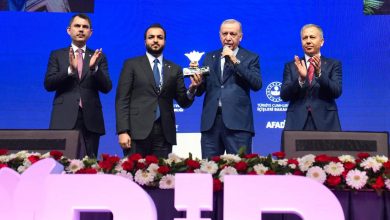
Distinguished historian Fuat Sezgin leaves a massive legacy behind
فؤاد سزكين يرحل وتظل أعماله مجدا للحضارة الإسلامية
Professor Fuat Sezgin, one of the most respected historians of Islamic science and the recipient of the Presidential Culture and Art Grand Prize, died on Saturday at the age of 94 from undisclosed reasons.
Sezgin, who was born on Oct. 24, 1924 in the eastern province of Erzurum, completed his primary and secondary schooling there before moving to Istanbul to study at university.
His initial inclination was to study mathematics and become an engineer. On the advice of a relative, Sezgin attended a seminar in the Institute for the Oriental Studies at Istanbul University that was given by the German orientalist Hellmut Ritter, who was one of the most renowned specialists in his field. This caused Sezgin to change his plans radically.
Under the influence of Ritter, Sezgin went to the institute to enroll in the courses. Ritter suggested Sezgin focus on his studies on orientalism and Islamic sciences. After completing his bachelor’s degree in literature, he completed his Ph.D. in Arabic language and literature, with his thesis on Persian scholar Muhammad al-Bukhari (810 -870). Al-Bukhari’s use of written sources proved that the claims of the previous academics regarding hadith scholars just using oral traditions were wrong.
In 1956, Sezgin published his dissertation titled “Studies in the Written Sources of al-Bukhari.”
After the 1960 military coup, he found himself as one of the 147 academics banned from university, which led him to move to Germany to work as a visiting professor at the University of Frankfurt. He submitted his second Ph.D. thesis in 1965 to the University of Frankfurt’s Institut für Geschichte der Naturwissenschaften and became a full professor the same year.
Around the same time, he married orientalist Ursula Sezgin, who gave birth to their daughter Hilal in 1970. He is widely known for his Arab-Islamic History of Science, whose first volume he published in 1967 and was working on its 18th volume the time of his death. He was editing the Journal for the History of Arabic-Islamic Science since 1984.
His research in Frankfurt focused on Islam’s Golden Age of Science between the eighth and 14th centuries.
In 1982, Sezgin founded the Institute for the Arabic-Islamic Sciences (Institut für Geschichte der Arabisch-Islamischen Wissenschaften), which is affiliated to the Goethe University in Frankfurt. It houses one of the largest collection of texts on the history of Arabic and Islamic science. He also established a museum showcasing over 800 copies of scientific tools, devises and maps built by Sezgin based on their original descriptions in written sources.
A similar museum named the Museum for the History of Science and Technology in Islam was opened in Istanbul in 2008 in the Gülhane Park near the Sultanahmet Square. The Istanbul museum houses around 700 objects. Sezgin wrote a five-volume work of 1,121 pages entitled, “Science and Technology in Islam” which introduces the instruments in the museums in Istanbul and Frankfurt. He founded the Professor Fuat Sezgin Research Foundation for the History of Science in Islam in 2010 to support the museum’s work. In 2013, he founded the Professor Dr. Fuat Sezgin Institute for the History of Science in the Fatih Sultan Mehmet University. And in 2015, he established the Professor Fuat Sezgin Research Foundation for the History of Science in Islam Publishing House. In 1978, Fuat Sezgin received the King Faysal International Prize for Islamic Studies. When this award was presented to him, he used it to found the Institute for the Arabic-Islamic Sciences in Frankfurt. He received honorary doctorates from several Turkish universities.
He was a member of the Academy of the Arabic Language in Cairo, The Academy of the Arabic Language in Damascus, the Academy of the Kingdom of Morocco, the Academy of the Arabic Language in Baghdad and honorary member of the Turkish Academy of Sciences. He also holds the Goethe Plaque of the City of Frankfurt, the Great Medal for Distinguished Service of the Federal Republic of Germany, the Iranian Book Award for the Islamic Sciences, the Hessian Cultural Prize and the Presidency of the Republic of Turkey Great Award for Culture and Art.
GERMAN SEIZURE OF HIS ARCHIVE
It is the institute in Frankfurt that houses around 45,000 texts, most of them the only remaining originals in the world that stand out as his life’s work. Last year, Sezgin was involved in a legal battle in Germany over his desire to bring to Turkey over 30,000 of the 45,000 books he collected over the years through his academic research. Sezgin argued that the Turkish government had established an institute in his name and he simply wanted to bring his private library to Turkey. However, German customs seized the books, arguing that they were cultural artifacts that belonged to Germany.
German prosecutors initiated a criminal inquiry, accusing Sezgin of attempting the embezzlement of institute property by trying to take the books to Turkey. The prosecutors also claimed that Sezgin was a close friend of President Recep Tayyip Erdoğan. German authorities also argued that if the books had a listed price of over 50,000 euros, a ministerial permission was necessary for their move. German authorities later realized that the books were not cultural artifacts, which led the prosecutors to drop the charges.
However, the dropping of the criminal charges did not end the debate over who owned the books, Sezgin or the institute. An administrative court banned the removal of the books from Germany and sealed Sezgin’s office at the institute he had founded.
Last year, Sezgin had said he wanted to continue his work but did not have access to his documents in his own office. Many Turkish academics believe Sezgin’s treatment, especially the ban on the books he personally paid for, is linked to the deteriorating relations between the two countries.
LAID TO REST
President Erdoğan, Prime Minister Binali Yıldırım, Energy Minister Berat Albayrak and many other top officials were present at the funeral prayers held for Sezgin at Istanbul’s Fatih Mosque yesterday.
Erdoğan, speaking after the prayers, said the government intended to declare 2019 as the Professor Fuat Sezgin History of Islamic Science Year. He also said that efforts to repatriate Sezgin’s personal archive would continue. He was buried next to the institute, in Gülhane Park, as he wished.
source: dailysabah.com
ودعت تركيا والعالم الأسلامي السبت الماضي 30 يونيو 2018م المؤرخ الإسلامي ” فؤاد سزكين” والذي عمد على أعادة الأعتبار إلى الحضارة الإسلامية، وقد توفي عن عمر ناهز ال 94 عاماً، حيث أمضى شهوره الأخيرة متجولاً بين مكتبات أسطنبول.
وقد شيع جنازته جمع غفير من أبناء تركيا وعلى رأسهم الرئيس التركي “رجب طيب أردوغان” وكان الرئيس قد نعى المؤرخ في تغريدة له على تويتر مؤكداً فيها أن الراحل كان عالماً كبيراً وقد استطاع أن يحيي الحضارة الاسلامية من جديد من خلال أبحاثه التى أجراها في مجال تاريخ علوم الاسلام.
وفي سطور قليلة سنكتب بأيجاز عنه:
هو فؤاد سيزكين ولد بتركيا وبالتحديد في جنوب شرقها لعام 1924م، وقد تعلم اللغة العربية ليحصل على الدكتوراه عام 1954م بأطروحة “مصادر البخاري”، ويعتبر أحد أبرز الضالعين في التراث العربي والإسلامي على مستوى العالم. حيث اعتنى بإنجازات المسلمين العلمية ومساهماتهم في تطوير العلوم الطبيعية ونقلها إلى الغرب، والاختراعات التي سبقوا بها غيرهم، وآثار كل هذا على تطور العلوم في الغرب حتى يومنا هذا.
وقد عمل كمدير لمعهد دراسات التاريخ والعلوم الإسلامية والعربية فى ألمانيا، والذي كان أحد مؤسسيه، ثم أًصبح أستاذاً في جامعة إسطنبول عام 1954، ثم واصل دراساته في جامعة فرانكفورت بعد أن منع من العمل في تركيا عام 1960م.
وكان المؤرخ التركي الراحل يتقن 27 لغة، من بينها السريانية والعبرية واللاتينية والعربية والألمانية.
ومن أهم مؤلفاته:
تاريخ التراث العربي الإسلامي باللغة الألمانية، الذي بدأ بجمع مواده سنة 1947 ميلادية، وموسوعة تاريخ الأدب العربي في 12 جزءاً بداية من عام 1967 حتى عام 2007.
ونُشرت له رسالة الدكتوراه تحت عنوان “دراسات حول مصادر البخاري” سنة 1956، والتي أثارت جدلاً في العالم الإسلامي.
وفي العام 1965م ، قدّم أطروحة دكتوراه ثانية عن عالم الكيمياء العربي، جابر بن حيان، وحصل على لقب البروفيسور بعد عام على طرحها.
وكان في نهاية حياته يواصل كتابة المجلد الـ18 من “تاريخ التراث العربي” الذي صدرت أولى مجلداته في 1967م، ويعد أوسع مؤلف يتناول تاريخ البشر.
وكتب 18 مجلداً عن التراث العربي، كما أنشأ في 2010، وقف أبحاث تاريخ العلوم الإسلامية بهدف دعم أنشطة متحف العلوم والتكنولوجيا الإسلامية في إسطنبول.
وقد توّج بالدكتوراه الفخرية من قبل جامعات عديدة، مثل “أتاتورك” في ولاية أرضروم التركية، و”سليمان ديميرال” في ولاية إسبارطة، وجامعة إسطنبول، فضلاً عن درع تكريم جامعة غوته الألمانية له، وميدالية الخدمة الاتحادية للدرجة الأولى بألمانيا، والجائزة الرئاسية الكبرى للثقافة والفنون بتركيا.
كما كُتب عنه كتاب بعنوان: (مكتشف الكنز المفقود فؤاد سزكين).
ومن كلماته الشهيرة التى توضح حال المسلمين : “أن تجعل المسلمين يفهمون عظمة الحضارة الإسلامية أصعب من أنْ تجعل الغرب يفهمها”.;




